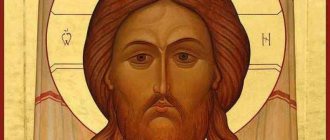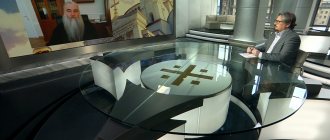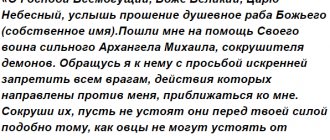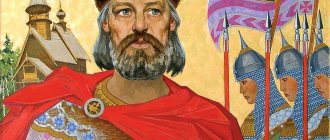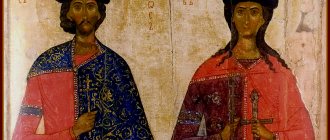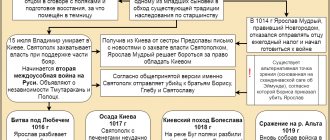| Metropolitan Benjamin (Pushkar) |
Veniamin (Pushkar)
(born 1938), Metropolitan b. Vladivostok and Primorsky, rector of the Vladivostok Theological School In the world Pushkar Boris Nikolaevich, was born on November 8, 1938 in the city of Khorol, Primorsky Territory, into a large working-class family. In 1947, the family moved to Vladivostok. His mother and grandmother were deeply religious, but due to the lack of a church, Boris himself was baptized only at the age of 7. His father was taken to the front at the very beginning of the war, returned crippled and soon died from his wounds.
In 1957 he graduated from high school in the city of Vladivostok. He was not accepted into the Soviet Army due to illness. Having received the blessing of the parish priest, Boris applied to the seminary and, before entering, served as an altar boy in the church.
At the same time, in order to earn a piece of bread, he had to work as a fitter at the largest ship repair enterprise in the Far East, Dalzavod.
In 1959-1963 he studied at the MDS. In 1963-1967 he studied at the Moscow Academy of Sciences, graduated with a candidate of theology degree and was retained as a professorial fellow at the academy.
In 1967 he was appointed teacher of biblical history, and also lectured on basic theology and logic. Since 1976 - Associate Professor at the Moscow Academy of Sciences.
In 1988, he was ordained a deacon by the rector of the Moscow Academy of Arts and Sciences, Archbishop Alexander (Timofeev) of Dmitrov.
In the same year he was ordained a priest.
In 1992 he was elevated to the rank of archpriest.
On August 12, 1992, by resolution of the Holy Synod, he was determined to be Bishop of Vladivostok and Primorsky.
On September 13 of the same year, he was tonsured a monk with the name Veniamin - in honor of the Hieromartyr Veniamin, Metropolitan of Petrograd and Gdov.
On September 20, 1992, he was elevated to the rank of archimandrite.
On September 21, 1992, he was consecrated Bishop of Vladivostok and Primorsky. The ordination in the Epiphany Cathedral in Moscow was performed by Patriarch Alexy II of Moscow and All Rus'; Metropolitans of Krutitsky and Kolomna Yuvenaly (Poyarkov), Volokolamsk and Yuryevsky Pitirim (Nechaev); Archbishop of Solnechnogorsk Sergius (Fomin); Bishops of Istra Arseny (Epifanov), Dmitrovsky Filaret (Karagodin), Podolsky Victor (Pyankov).
Since 1996 he has been the rector of the Vladivostok Theological School.
In 1996, in his Easter sermon, Bishop Benjamin said:
“... schisms are bedeviling the Russian Church.
Uninvited heirs are eager to quickly divide the “Russian heritage”... schismatics are tormenting Holy Rus' from all sides, Russophobes are threatening our national shrines from all sides... insidious renovationism again seeks to destroy church life from the inside, to tear it away from the blessed roots of the centuries-old Holy Tradition, to deprive it of continuity and canonical impeccability . Under the slogan of church “reforms” and “renewal in the spirit of the times,” supporters of the “liberalization” of the Church are again trying to shake the foundations of Russian Orthodoxy... The crafty heresy of ecumenism threatens the purity and intact integrity of church teaching.” Vladyka Veniamin is a monarchist by conviction. In 1995, he sent his representative to the Second All-Russian Monarchist Conference held in Belgorod (Archbishops John (Popov) of Belgorod and Yuvenaly (Tarasov) of Kursk also took part in it. The brotherhood in the name of the Holy Martyr Tsar Nicholas II is active in the diocese. In December 1996, Bishop Veniamin addressed the 1997 Council of Bishops with a request to remove from the documents of the Synodal Commission for the Canonization of Saints the contrast between the two periods of the life of Nicholas II (before the revolution and after), since, in his opinion, it is impossible to divide a person’s life into stages, deciding when was he holy?
In January 1997, he spoke at a press conference on the prospects for the canonization of Grigory Rasputin.
In 1996, the diocese entered into an Agreement on interaction with the Russian Pacific Fleet on the issue of spiritual and moral education of military personnel. In February 1997, Bishop. Veniamin participated as a crew member in the cruise of the missile cruiser "Varyag" to the Republic of Korea, and in June 1997 - in the visit of the cruiser "Admiral Vinogradov" to Tokyo.
| Archbishop Benjamin (Pushkar) |
On February 25, 2003, he was elevated to the rank of archbishop.
Since July 27, 2009 - member of the Inter-Council Presence of the Russian Orthodox Church.
From July 27 to November 6, 2011, he temporarily ruled the newly formed Arsenyevsk and Dalnegorsk diocese.
On October 6, 2011, he was appointed head of the Primorsky Metropolis.
On October 8, 2011, he was elevated to the rank of metropolitan by Patriarch Kirill (Gundyaev) of Moscow and All Rus' in the Assumption Cathedral of the Trinity-Sergius Lavra.
On December 27, 2011, he was confirmed as rector (hieroarchimandrite) of the Holy Trinity St. Nicholas Monastery in the village of Gornye Klyuchi, Primorsky Territory [1].
On December 28, 2022, he was retired due to reaching the age of 75. The city of Vladivostok is determined as the place of residence of Metropolitan Benjamin [2].
Biography
The future ruler was born in a small village called Khorol in the Primorsky Territory, in the Far East. In the world the boy's name was Boris. The guy grew up in a simple working-class family. Bori's mother and grandmother were very religious and God-fearing people. But the child’s baptism took place only 7 years later, due to the fact that there were no churches nearby.
Metropolitan Benjamin (Pushkar)
Boris's father, Nikolai Pushkar, was called up to the front at the beginning of the Great Patriotic War. Upon returning home, he soon died from wounds received during the fighting.
Orthodox education
Boris was accustomed to work from an early age and actively helped his mother and brothers. In 1947, the whole family moved to Vladivostok for permanent residence. Here the boy received his secondary education and in 1957 became a fitter at the large Dalzavod enterprise. He was not accepted into the army due to illness.
For two years he served as a sexton in the only Orthodox church on Pervaya Rechka. And ultimately, I decided to enter the Moscow Theological Seminary. The rector of the parish blessed Boris - in 1959 he successfully entered the educational institution.
Having completed his studies at the seminary, Boris Pushkar submits documents to the Moscow Theological Academy. In 1967, he completed it and defended his candidate's dissertation on the topic “Proof of the existence of God and the immortality of the soul in the philosophical system of E. Kant and their analysis on the basis of the Christian worldview.”
Interesting! The young man decided to connect his future activities with teaching at the same academy. He was left at the MDA as a professorial fellow, after which he began teaching several disciplines: biblical history, logic and basic theology.
Nine years later, Boris Nikolaevich becomes an associate professor at the academy.
Church service
Until 1988, Boris did not take priestly rank. And only after a trip to the Holy Land, upon returning to Moscow, he was ordained by the rector of the MDA, Archbishop Alexander, as a deacon, and then as a priest. Thus began the bishop’s church path. When he was elevated to the rank of archpriest in 1992, the Holy Synod at a meeting in early August decided to appoint Pushkar as Bishop of Vladivostok and Primorsky.
Divine Liturgy of Metropolitan Veniamin
A month later, Boris took monastic vows with the name Benjamin. This was followed by his elevation to the rank of archimandrite. The rite of consecration with consecration as Bishop of Vladivostok and Primorsky took place on September 21 in the Epiphany Cathedral in Moscow.
The Bishop arrived in the diocese under his jurisdiction at the end of October. It should be noted that her condition was extremely deplorable. There was a catastrophic shortage of churches. Father Benjamin responsibly began to fulfill his duties.
During the nine years of his leadership, the situation has changed significantly. The number of parishes tripled. Two monasteries were revived - the Holy Trinity men's monastery and the Nativity of the Virgin Mary of the South Ussuriysk women's monastery. Two new monasteries were also established. More and more new churches are appearing in the Primorsky Territory.
Since 1996, interaction with the Pacific Fleet began on the issue of spiritual and moral education of sailors. Subsequently, the bishop more than once participated in military flights to Korea and Japan.
The year 2004 was marked for the clergyman with a trip on the cruiser “Varyag” to Incheon (Korea), where the opening ceremony of the monument to Russian sailors who died in the Russo-Japanese War took place.
Establishment of the Primorsky Metropolis
Bishop Veniamin began preparing the basis for the establishment of a religious school, which he later headed himself. Today the building also houses the administration of the diocese.
Theological School of Vladivostok
Six years after his elevation to the rank of archbishop, Vladyka became a member of the Inter-Council Presence of the Russian Orthodox Church. And already in 2011 he became a metropolitan, in connection with the establishment of the Primorsky Metropolis.
Two years later, in December, Benjamin took over the abbotship of the Holy Trinity Nicholas Monastery. In 2013, Vladyka turned 75 years old. The Metropolitan turned to the Holy Synod with a request to retire. The meeting blessed the saint for his further management of the diocese and thanked him for his contribution to the development of the diocese and the spiritual care of the entrusted flock.
In 2022, Father Veniamin retired with support from the Vladivostok Diocesan Administration.
Awards
Secular
- Order of Merit for the Fatherland, IV degree (2009)[7]
- Order of Friendship
- Title “Honorary Citizen of the City of Vladivostok” (2005)[8]
Church
- Order of the Holy Blessed Prince Daniel of Moscow, II degree (1998)
- Order of St. Sergius of Radonezh, II degree (2002)
- Order of St. Seraphim of Sarov, II degree (2007)[9]
- Memorial panagia (2012)[10]
- Order of St. Sergius of Radonezh, 1st degree (2013)[11]
- Synodal Order of the Kursk-Root Icon of the Mother of God, II degree (2012)[12]
Essays
Vladyka Benjamin has established himself as a talented hymn compiler. His authorship belongs to the canon “Lamentation for Russia,” which was written following the example of the Repentant Canon of St. Andrew of Crete.
Book of Metropolitan Benjamin (Pushkar)
In addition, the saint wrote the Holy Biblical story in his own presentation. He also contributed in every possible way to the publication of other educational literature by Orthodox writers.
Notes
- [www.srcc.msu.ru/bib_roc/jmp/02/02-02/11.htm/ Under the cross and St. Andrew’s flag] // Journal of the Moscow Patriarchate 02-2002
- [vladivostok.eparhia.ru/society/we/episkop/ Archbishop Benjamin: “I have a sea soul”] // Official website of the Vladivostok Diocese of the MP ROC
- [www.pravoslavie.ru/news/9022.htm/ Archbishop Benjamin returned from the campaign] // Orthodoxy. Ru
- [www.patriarchia.ru/db/text/1641775.html His Holiness Patriarch Kirill elevated a number of bishops of the Russian Orthodox Church to the rank of metropolitan]
- [www.patriarchia.ru/db/text/1909396.html Journals of the meeting of the Holy Synod of December 27-28, 2011. Journal No. 169]
- [www.patriarchia.ru/db/text/3478892.html Journals of the meeting of the Holy Synod of December 25-26, 2013. Journal No. 166]
- [www.patriarchia.ru/db/text/672035.html Archbishop of Vladivostok and Primorsky Veniamin was awarded the Order of Merit for the Fatherland]
- [vlc.ru/city/citizens/ Honorary citizens] // Official website of the Vladivostok administration
- [www.patriarchia.ru/db/text/296265.html Patriarchal congratulations to Archbishop Benjamin of Vladivostok on the 15th anniversary of his episcopal consecration]
- [www.patriarchia.ru/db/text/2481639.html Patriarchal congratulations to Metropolitan Benjamin of Vladivostok on the 20th anniversary of his episcopal consecration / Patriarch / Patriarchia.ru]
- [www.patriarchia.ru/db/text/3353183.html Patriarchal congratulations to Metropolitan Benjamin of Vladivostok on his 75th birthday]
- [synod.com/synod/2013/20131125_vladivostokkurskicondepart.html Russian Orthodox Church Outside of Russia - Official Page]
Excerpt characterizing Benjamin (Pushkar)
- Guard! Killed!.. Killed a man! Brothers!.. - Oh, fathers, they killed him to death, they killed a man! - the woman squealed as she came out of the neighboring gate. A crowd of people gathered around the bloody blacksmith. “It’s not enough that you robbed people, took off their shirts,” said someone’s voice, turning to the kisser, “why did you kill a person?” Robber! The tall fellow, standing on the porch, looked with dull eyes first at the kisser, then at the blacksmiths, as if wondering who he should fight with now. - Murderer! – he suddenly shouted at the kisser. - Knit it, guys! - Why, I tied up one such and such! - the kisser shouted, waving off the people who attacked him, and, tearing off his hat, he threw it on the ground. As if this action had some mysteriously threatening significance, the factory workers who surrounded the kisser stopped in indecision. “Brother, I know the order very well.” I'll get to the private part. Do you think I won't make it? Nowadays no one is ordered to commit robbery! – the kisser shouted, raising his hat. - And let's go, look! And let's go... look! - the kisser and the tall fellow repeated one after another, and both moved forward along the street together. The bloody blacksmith walked next to them. Factory workers and strangers followed them, talking and shouting. At the corner of Maroseyka, opposite a large house with locked shutters, on which there was a sign of a shoemaker, stood with sad faces about twenty shoemakers, thin, exhausted people in dressing gowns and tattered tunics. - He will treat the people properly! - said a thin craftsman with a scraggly beard and frowning eyebrows. - Well, he sucked our blood - and that’s it. He drove us and drove us - all week. And now he brought it to the last end, and left. Seeing the people and the bloody man, the worker who had been speaking fell silent, and all the shoemakers, with hasty curiosity, joined the moving crowd. -Where are the people going? - It is known where, he goes to the authorities. - Well, did our power really not take over? - And you thought how! Look what the people are saying. Questions and answers were heard. The kisser, taking advantage of the increase in the crowd, fell behind the people and returned to his tavern. The tall fellow, not noticing the disappearance of his enemy the kisser, waving his bare arm, did not stop talking, thereby drawing everyone’s attention to himself. The people mostly pressed on him, expecting from him to get a solution to all the questions that occupied them. - Show him order, show him the law, that’s what the authorities are in charge of! Is that what I say, Orthodox? - said the tall fellow, smiling slightly. – He thinks, and there are no authorities? Is it possible without bosses? Otherwise, you never know how to rob them. - What nonsense to say! - responded in the crowd. - Well, then they’ll abandon Moscow! They told you to laugh, but you believed it. You never know how many of our troops are coming. So they let him in! That's what the authorities do. “Listen to what the people are saying,” they said, pointing to the tall fellow. Near the wall of China City, another small group of people surrounded a man in a frieze overcoat holding a paper in his hands. - The decree, the decree is being read! The decree is being read! - was heard in the crowd, and people rushed to the reader. A man in a frieze overcoat was reading a poster dated August 31st. When the crowd surrounded him, he seemed embarrassed, but in response to the demand of the tall fellow who had pushed ahead of him, with a slight trembling in his voice, he began to read the poster from the beginning. “Tomorrow I’m going early to the Most Serene Prince,” he read (the brightening one! - the tall fellow solemnly repeated, smiling with his mouth and frowning his eyebrows), “to talk with him, act and help the troops exterminate the villains; We too will become the spirit of them...” the reader continued and stopped (“Saw?” the little one shouted victoriously. “He will untie you all the distance...”) ... - to eradicate and send these guests to hell; I’ll come back for lunch, and we’ll get down to business, we’ll do it, we’ll finish it, and we’ll get rid of the villains.” The last words were read by the reader in complete silence. The tall fellow sadly lowered his head. It was obvious that no one understood these last words. In particular, the words: “I will come tomorrow for lunch,” apparently even upset both the reader and the listeners. The understanding of the people was in a high mood, and this was too simple and unnecessary understandable; this was the very thing that each of them could say and that therefore a decree emanating from a higher power could not speak. Everyone stood in dejected silence. The tall fellow moved his lips and staggered. “I should ask him!.. That’s what he is?.. Well, he asked!.. But then... He’ll point out...” was suddenly heard in the back rows of the crowd, and everyone’s attention turned to the droshky of the police chief, accompanied by two mounted dragoons. The police chief, who had gone that morning by order of the count to burn the barges and, on the occasion of this order, had rescued a large sum of money that was in his pocket at that moment, seeing a crowd of people moving towards him, ordered the coachman to stop. - What kind of people? - he shouted at the people, scattered and timidly approaching the droshky. - What kind of people? I'm asking you? - repeated the police chief, who did not receive an answer. “They, your honor,” said the clerk in the frieze overcoat, “they, your highness, at the announcement of the most illustrious count, without sparing their lives, wanted to serve, and not like some kind of riot, as said from the most illustrious count...” “The count did not leave, he here, and there will be orders about you,” said the police chief. - Let's go! - he said to the coachman. The crowd stopped, crowding around those who had heard what the authorities said, and looking at the droshky driving away. At that time, the police chief looked around in fear and said something to the coachman, and his horses went faster. - Cheating, guys! Lead to it yourself! - shouted the voice of a tall guy. - Don't let me go, guys! Let him submit the report! Hold it! - voices shouted, and people ran after the droshky. The crowd behind the police chief, talking noisily, headed to the Lubyanka. - Well, the gentlemen and the merchants have left, and that’s why we are lost? Well, we are dogs, or what! – was heard more often in the crowd. On the evening of September 1, after his meeting with Kutuzov, Count Rastopchin, upset and offended by the fact that he was not invited to the military council, that Kutuzov did not pay any attention to his proposal to take part in the defense of the capital, and surprised by the new look that opened up to him in the camp , in which the question of the calm of the capital and its patriotic mood turned out to be not only secondary, but completely unnecessary and insignificant - upset, offended and surprised by all this, Count Rostopchin returned to Moscow. After dinner, the count, without undressing, lay down on the sofa and at one o'clock was awakened by a courier who brought him a letter from Kutuzov. The letter said that since the troops were retreating to the Ryazan road outside Moscow, would the count like to send police officials to lead the troops through the city. This news was not news to Rostopchin. Not only from yesterday’s meeting with Kutuzov on Poklonnaya Hill, but also from the Battle of Borodino itself, when all the generals who came to Moscow unanimously said that another battle could not be fought, and when, with the count’s permission, every night government property and residents were already removing up to half let's leave - Count Rastopchin knew that Moscow would be abandoned; but nevertheless, this news, communicated in the form of a simple note with an order from Kutuzov and received at night, during his first sleep, surprised and irritated the count. Subsequently, explaining his activities during this time, Count Rostopchin wrote several times in his notes that he then had two important goals: De maintenir la tranquillite a Moscow et d'en faire partir les habitants. [Keep calm in Moscow and escort the residents out of it.] If we allow this dual goal, every action of Rostopchin turns out to be impeccable. Why were the Moscow shrine, weapons, cartridges, gunpowder, grain supplies not taken out, why were thousands of residents deceived by the fact that Moscow would not be surrendered, and ruined? – In order to maintain calm in the capital, Count Rastopchin’s explanation answers. Why were piles of unnecessary papers removed from public places and the Leppich ball and other items? – In order to leave the city empty, Count Rastopchin’s explanation answers. One has only to admit that something threatened the people's peace, and any action becomes justified. All the horrors of terror were based only on concern for public peace. What was Count Rastopchin’s fear of public peace in Moscow based on in 1812? What reason was there for supposing there was a tendency towards indignation in the city? Residents left, troops, retreating, filled Moscow. Why should the people rebel as a result of this? Not only in Moscow, but throughout Russia, upon the entry of the enemy, nothing resembling indignation occurred. On September 1st and 2nd, more than ten thousand people remained in Moscow, and apart from the crowd that had gathered in the courtyard of the commander-in-chief and attracted by him himself, there was nothing. Obviously, it would be even less necessary to expect unrest among the people if after the Battle of Borodino, when the abandonment of Moscow became obvious, or, at least, probably, if then, instead of agitating the people with the distribution of weapons and posters, Rostopchin took measures to the removal of all sacred objects, gunpowder, charges and money, and would directly announce to the people that the city was being abandoned.
